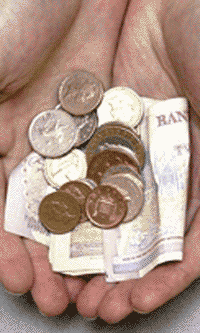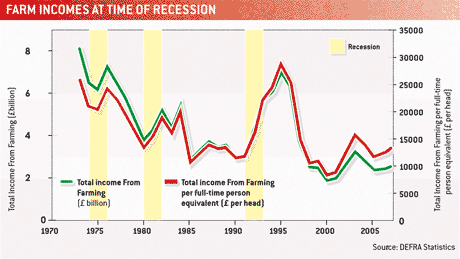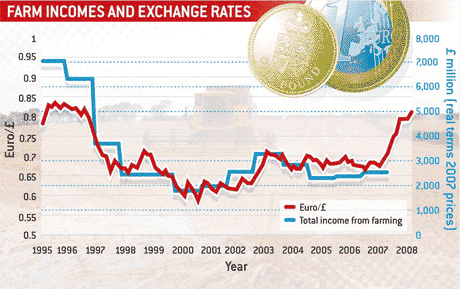Can agriculture beat the downturn yet again?

There is a view in some circles that farming actually does rather well out of a recession.
That was certainly the case in the mid-1970s, when farm incomes jumped in the aftermath of the world oil crisis, and again in the early 1990s, when the housing market collapsed and sterling was forced out of the Exchange Rate Mechanism.

But what about the here and now? Will agriculture again benefit as the economic downturn sets in?
NFU head of economics and international affairs, Tom Hind, is not so sure. There are many factors at play, and food and farming will not be immune as, nationally, unemployment rises and consumer spending falls, he says.
OVERALL DEMAND
While overall demand for food is fairly “inelastic” – not sensitive to price changes – there is already some evidence of consumers trading down, looking for cheaper cuts of meat and more basic dairy products.
There are also signs of a shift away from the main supermarkets towards the discount stores such as Lidl and Netto. “This will increase competition among retailers and encourage them to put further pressure on suppliers,” says Mr Hind. “This is our biggest short-term worry.”
The costs and availability of credit is another major concern. Even though the Bank of England has cut base rates substantially, and will probably continue to do so, it is the LIBOR interbank lending rate that matters and this has not moved down in tandem.
“The premiums banks are charging above base rates have increased and, with agricultural borrowing at record levels, the cost of servicing debt is putting pressure on some farm businesses,” says Mr Hind.
CURRENCY EFFECTS
“There may have been a huge effort by government to recapitalise the banks, but the whole sector is extremely nervous and the credit squeeze is still on.”
Mr Hind is also concerned that, while agriculture is still a relatively safe bet for lenders, farmers who are looking to diversify, for example into food processing or recreation, are going to find it hard to access credit.
But there is a flip side, and agriculture will not be the worst affected sector of the economy, mainly due to the currency effects.

Historically, there is a strong link between farm incomes and the prevailing exchange rate (see graph). With organisations such as the OECD and IMF suggesting that the UK economy will suffer a deeper and longer recession than other EU member states, sterling has come under real pressure, reaching an all-time low against the euro in early December.
A weak pound means exports are more competitive, while imports cost more, which helps support commodity prices, boost single farm payments and so raise farm incomes.
And what of commodity markets? Global dairy and grain prices have clearly been under pressure for some time, but analysts believe this is just a short-term blip.
GLOBAL SUPPLY
According to Nathan Losey of AgResource in Chicago, global supply is starting to contract again in many sectors. For example, wheat plantings are significantly down due to the 2008 cost:price squeeze, while beef production is also expected to stay tight.
Demand for agricultural commodities is also likely to remain strong next year in key markets like China and India. These economies may have seen some slowing down, but they are still growing at 5% to 8% a year.
As incomes increase, so does the demand for a western-style diet, which is good for meat and dairy. “Once these people have put good food in their mouths, they do not want you to take it away again,” says Mr Losey. “They would rather give up something else.”
He therefore sees a good recovery in world commodity prices in 2009, despite the recession.
- VIDEO Economics editor Philip Clarke on agriculture on the recession
